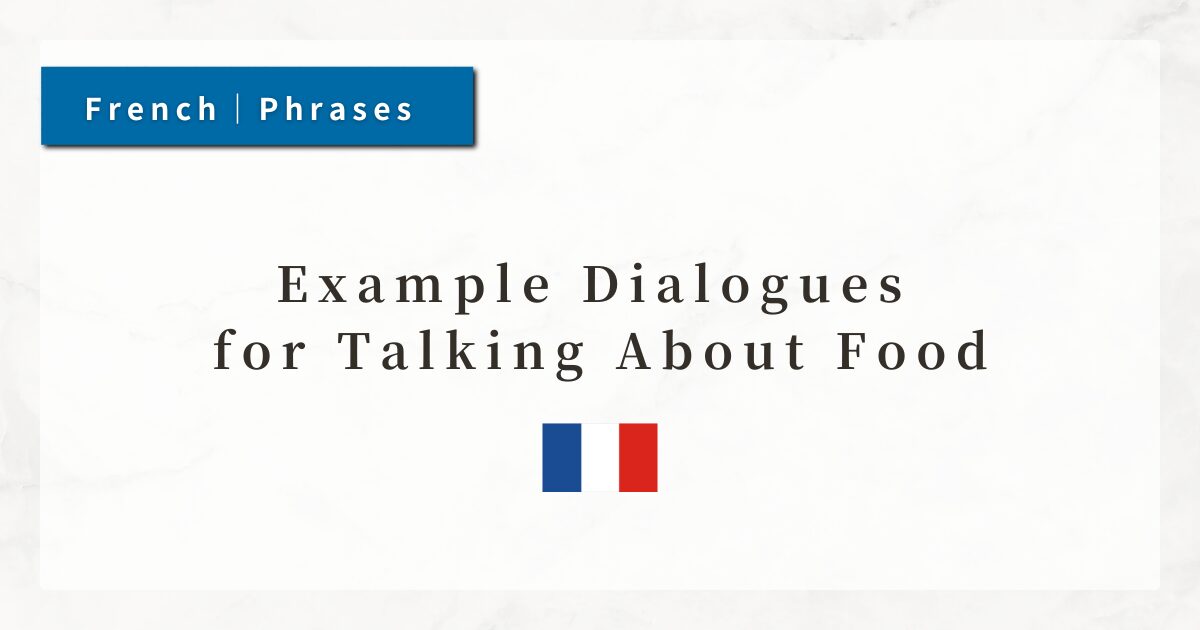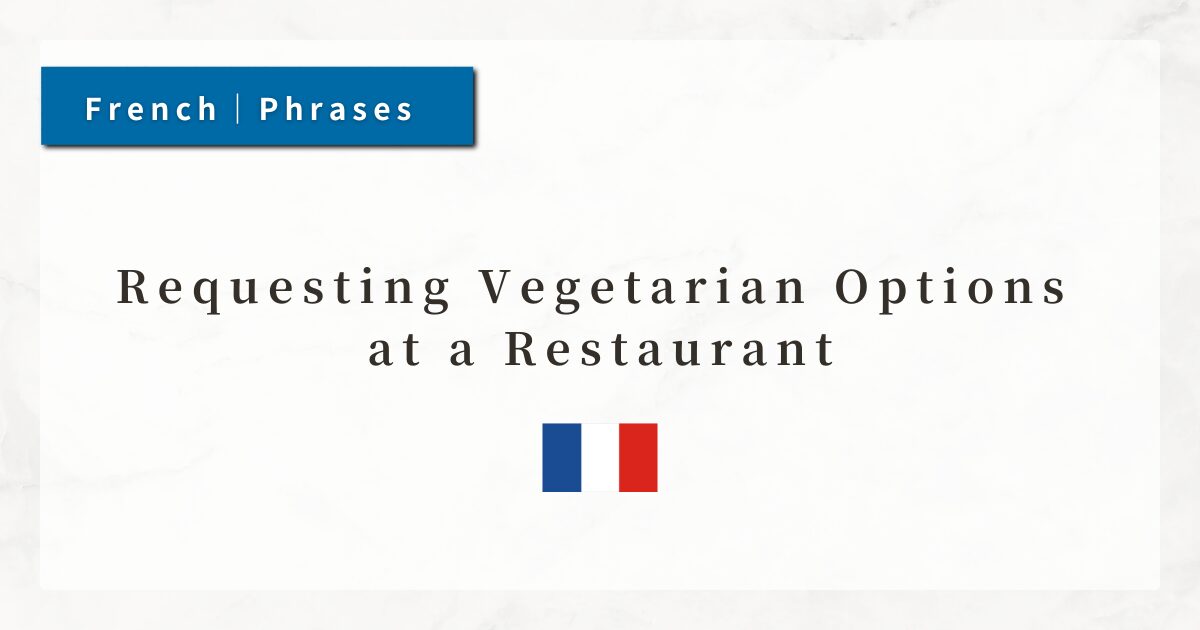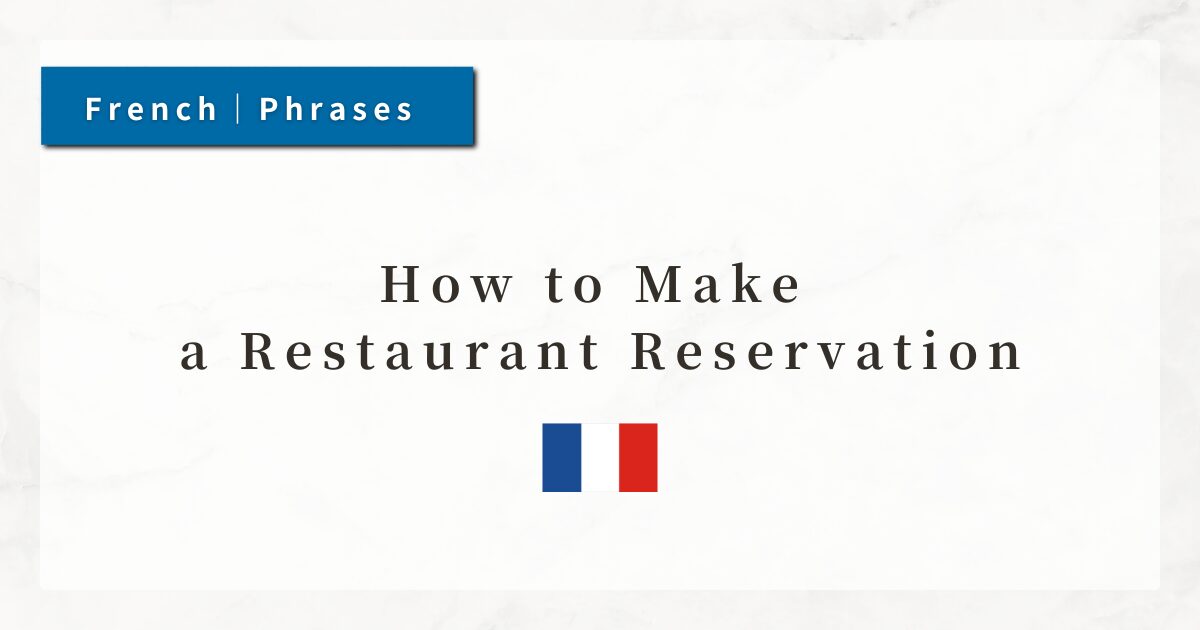#13 Example Dialogues for Talking About Food|French Phrases

In conversations with friends or family, questions such as “Do you cook?” or “What do you usually make?” are very common.
Learning vocabulary and expressions related to cooking is useful for sharing your hobbies and lifestyle.
In this lesson, we will study basic French vocabulary and expressions about cooking, as well as related grammar points, through natural dialogue examples.
Dialogue

Tu cuisines souvent chez toi ?
(Do you often cook at home?)

Oui, j’aime bien cuisiner des plats maison.
(Yes, I enjoy cooking homemade dishes.)

Qu’est-ce que tu sais préparer ?
(What can you make?)

Je fais souvent des pâtes, des soupes, et parfois des desserts.
(I often make pasta and soups, and sometimes desserts.)

Moi, je ne cuisine presque jamais…
(I hardly ever cook myself…)

C’est dommage ! Tu veux que je t’apprenne une recette facile ?
(That’s a shame! Do you want me to teach you an easy recipe?)
1. Verbs for “to cook”: cuisiner / faire
To say “to cook,” the verb cuisiner is the first one to learn. It refers to the act of cooking in general and is common in everyday speech.
- J’aime cuisiner.
(I like to cook.) - Tu cuisines souvent ?
(Do you often cook?)
Cuisiner is also transitive, so it can take a direct object:
- Je cuisine une ratatouille.
(I am making a ratatouille.)
By contrast, faire (“to make, to do”) is highly versatile and often used in cooking contexts to mean “to prepare a dish.”
- Je fais des pâtes.
(I make pasta.)
This usage emphasizes the specific dish being prepared. In practice, “faire + dish name” is often more natural in everyday conversation than cuisiner.
- cuisiner
→ the act of cooking in general. - faire + dish name
→ to prepare a specific dish.
2. Expressing Likes: aimer + infinitive
To say “I like doing …” in French, use “aimer + infinitive.”
- J’aime cuisiner.
(I like cooking.) - J’aime lire.
(I like reading.)
Adding “bien” softens the tone, meaning “quite like” or “enjoy.”
- J’aime bien cuisiner.
(I rather like cooking / I enjoy cooking.)
When used with people, aimer can mean “to love,” so be mindful of context.
3. Expressing Ability: savoir + infinitive
The verb savoir (to know) can also mean “to know how to / to be able to” when followed by an infinitive.
- Je sais cuisiner.
(I can cook / I know how to cook.) - Tu sais préparer des crêpes ?
(Can you make crêpes?)
This construction emphasizes skill or ability.
- connaître
→to know a person, place, or thing - savoir + infinitive
→ to know how to do something
4. Adverbs of Frequency: souvent, parfois, etc.
To express frequency such as “often” or “sometimes,” use adverbs. In French, they typically appear right after the verb.
- Je fais souvent des pâtes.
(I often make pasta.) - Je fais parfois des desserts.
(I sometimes make desserts.)
5. Making Offers or Requests: vouloir que + subjunctive
When expressing a desire for someone else to do something, French uses “vouloir + que” followed by the subjunctive.
- Tu veux que je t’apprenne… ?
(Do you want me to teach you…?)
Here, apprendre (to teach/learn) is conjugated in the present subjunctive.
Subjunctive of apprendre (present)::
| Subject | Subjunctive |
|---|---|
| je | apprenne |
| tu | apprennes |
| il / elle | apprenne |
| nous | apprenions |
| vous | appreniez |
| ils / elles | apprennent |
Summary
- cuisiner
→ to cook (general act of cooking) - faire + dish name
→ to prepare a specific dish (very common in speech) - savoir + infinitive
→ to know how to / be able to do something - aimer + infinitive
→ to like doing something - vouloir que + subjunctive
→ to want someone to do something (e.g., Tu veux que je t’apprenne…?)




